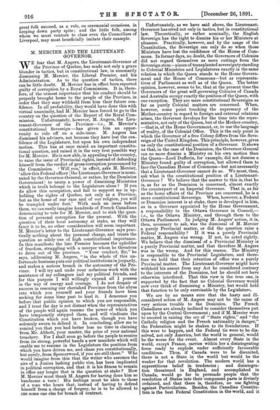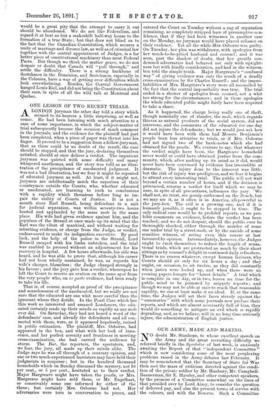M. MERCEER AND THE LIEUTENANT- GOVERNOR.
WE fear that M. Angers, the Lieutenant-Governor of the Province of Quebec, has made not only a grave blunder in tactics, but in constitutional law, in summarily dismissing M. Mercier, the Liberal Premier, and his Administration. As to the question of tactics, there can be little doubt. M. Mercier has in effect been reported guilty of corruption by a Royal Commission. It is, there- fore, of the utmost importance that his conduct should be properly brought home to the people of the Province, in order that they may withhold from him their future con- fidence. In all probability, they would have done this with virtual unanimity, had M. Mercier been forced to go to the country on the question of the Report of the Royal Com- mission. Unfortunately, however, M. Angers, the Lieu- tenant-Governor of the Province—i.e., M. Mercier's constitutional Sovereign—has given him an oppor- tunity to ride off on a side-issue. M. Angers has dismissed his advisers, not because they have lost the con- fidence of the Legislature, but upon his own independent motion. This has at once raised an important constitu- tional question, and raised it in the very best possible way for M. Mercier. He is now able, in appealing to the country, to raise the issue of Provincial rights, instead of defending himself from the verdict of gross corruption pronounced by the Commission. • Will you,' in effect, asks M. Mercier, allow this Federal officer [the Lieutenant-Governor is nomi- nated by the Governor-General, or rather, by the Dominion Government] to usurp a power of dismissing Ministries which in truth belongs to the Legislature alone ? If you do allow this usurpation, and fall to support me in up- holding the rights of Quebec, not only as a Province, but as the home of our race and of our religion, you will be trampled under foot.' With such an issue before them, we can easily imagine hundreds of French Canadians determining to vote for M. Mercier, and to sink the ques- tion of personal corruption for the present. With the question of their local autonomy at stake, as they will fancy it to be, no other consideration will seem important. M. Mercier's letter to the Lieutenant-Governor says prac- tically nothing about the personal charge, and treats the question as solely one of high constitutional importance. In this manifesto the late Premier becomes the upholder of freedom, struggling with a usurper whom he threatens to drive out of the province. "Your conduct, Sir," he says, addressing M. Angers, "in the whole of this un- fortunate business puts our political institutions in jeopardy, and makes a serious breach in the autonomy of the Pro- vince. I will try and undo your nefarious work with the assistance of my colleagues and my political friends, and for this purpose I will willingly expend all I possess in the way of energy and courage. I do not despair of success in rescuing our cherished Province from the abyss into which you yourself and your friends have been seeking for some time past to hurl it. I denounce you before that public opinion to which you are responsible, and I trust the day is not distant when the representatives of the people will again resume the power of which you have temporarily stripped them, and will vindicate the Constitution which you have broken, though you have solemnly sworn to defend it. In concluding, allow me to remind you that you had better lose no time in claiming 'from Mr. Abbott, your master, the price of your national treachery. For I shall soon go before the people to receive from its strong, powerful hands a new mandate which will enable me to resume in the Legislature the position from which you have driven me, and chase you constitutionally, but surely, from Spencerwood, if you are still there." Who would imagine from this that the writer who assumes the airs of a Junius lashing public vice, has been implicated in political corruption, and that it is his fitness to remain in office any longer that is the question at stake ? How M. Mercier must thank M. Angers for having done him so handsome a turn ! His feelings must be akin to those of a man who hears that, instead of having to defend himself from a charge of forgery, he is to be allowed to Pile some one else for breach of contract. Unfortunately, as we have said above, the Lieutenant- Governor has erred not only in tactics, but in constitutional Jaw. Theoretically, or rather nominally, the English Sovereign has the right to dismiss his or her Ministers at pleasure. Practically, however, and by the usage of the Constitution, the Sovereign can only do so when those Ministers have lost the confidence of the House of Com- mons. In former days, no doubt, the Governors of Colonies did not regard themselves as mere cuttings from the Sovereign stem—pieces of transplanted sovereignty standing to Colonial Ministries and Legislatures exactly in the same relation in which the Queen stands to the Home Govern- ment and the House of Commons—but as representa- tives of Parliament as well as of the Queen. The better opinion, however, seems to be, that at the present time the Governors of the great self-governing Colonies of Canada and Australia occupy exactly the position of the Queen, with one exception. They are mere constitutional Sovereigns as far as purely Colonial matters are concerned. When, however, some point touching the supremacy of the Mother-country in regard to foreign and external relations arises, the Governor develops for the time into the repre- sentative, not only of the Queen, but of the Mother-country, —that is, of the Home Government, or, to use the language of reality, of the Colonial Office. This is the only point in which the Governor of a free Colony differs from the Sove- reign of the United Kingdom. This principle, however, gives us only the constitutional position of a Governor. It shows us that, in the case of the Dominion, the Governor-General can no more dismiss a Ministry on his own motion than the Queen—Lord Dufferin, for example, did not dismiss a Ministry found guilty of corruption, but allowed them to face the Canadian House of Commons—but not necessarily that a Lieutenant-Governor cannot do so. We must, then, ask what is the constitutional position of a Lieutenant- Governor ? We believe that the answer to this is, that he is, as far as the Dominion is concerned, almost exactly the counterpart of an Imperial Governor. That is, as far as the home affairs of the Province are concerned, he is a mere constitutional Sovereign. When, however, a Federal or Dominion interest is at stake, there is developed in him, as in a Governor appointed by the Home Government, a responsibility to the Ottawa Governor in Council,- i.e., to the Ottawa Ministry, and through them to the Ottawa Parliament. In judging M. Angers' action, it is, then, necessary to ask, was the dismissal of M. Mercier a purely Provincial matter, or did the question raise a Federal responsibility ? If it was a purely Provincial matter, M. Angers was wrong. If not, he acted rightly. We believe that the dismissal of a Provincial Ministry is a purely Provincial matter, and that therefore M. Angers was in the wrong. And for this reason. The Ministry is responsible to the Provincial Legislature, and there- fore we hold that their retention of office was a purely Provincial matter. The Lieutenant-Governor might have withheld his assent from any Act he considered contrary to the interests of the Dominion, but he should not have otherwise interfered. That this view is the true one, is supported by the fact that no Colonial Governor would now ever think of dismissing a Ministry, but would hold that function to be only exercisable by the Legislature.
We are by no means sure that the hasty and ill- considered action of M. Angers may not be the cause of very serious trouble to the Dominion. The French Canadians are already inclined to consider themselves put upon by the Central Government ; and if M. Mercier were to succeed in raising the cry of "State rights," and "the Catholic religion and the French nationality in danger," the Federation might be shaken to its foundations. If this were to happen, and the Federal tie were to be dis- solved, not only America., but the world in general, would be the worse for the event. Almost every State in the world, except France, carries within her a disintegrating force ready to explode under sufficiently favourable conditions. Thus, if Canada were to be disunited, there- is not a State in the world but would be the weaker for that revolution. The modern world has a superstitious belief in tendencies ; and disintegra- tion threatened in England, and accomplished in Canada, would go far to persuade people that the resolution of States into their component parts is divinely ordained, and that there is, therefore, no use fighting against Particularism. Besides, the Canadian Constitu- tion is the best Federal Constitution in the 'world, and it would be a great pity that the attempt to carry it out should be abandoned. We do not like Federalism, and regard it at best as but a makeshift half-way house to the formation of a true State ; but that does not blind us to the fact that the Canadian Constitution, which secures a unity of marriage and divorce law, as well as of criminal law together with the central appointment of Judges, is a far better piece of constitutional machinery than most Federal Pacts. But though we think the matter grave, we do not despair or doubt that Canada will "pull through," and settle the difficulty. There is a strong backbone of Scotchmen in the Dominion, and Scotchmen, especially in the Colonies, have a way of getting over difficulties which look overwhelming. Besides, the Central Government hanged Louis Riel, and did not bring the Constitution about their ears, in spite of all the wild talk at Montreal and Quebec.



































 Previous page
Previous page